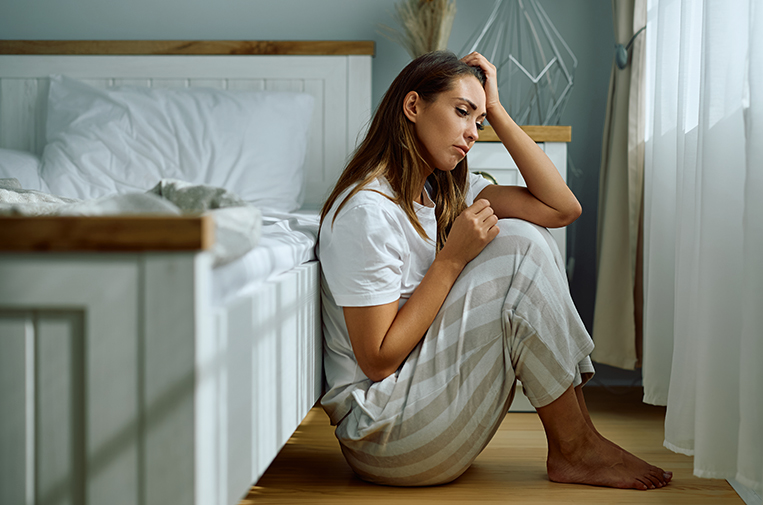“This is really hard to talk about. My husband and I have been married for years but I’m still having lots of pain when we have sex. Am I the only one?”
That question lingered for a hot second before I definitively replied, “No, you are not the only one.” And in that moment, you can feel the enormity of that burden and it just makes you sad. Pain during sex (the medical term is dyspareunia) is surprisingly common but it shouldn’t be a surprise.
This wonderful patient in front of me who had been smiling the entire time was suffering. She was needlessly suffering by herself because she didn’t really know that it had a name or that she had someone to talk to.
Female sexual pain (FSP), as dyspareunia is sometimes called, is common! If you don’t have it, you know someone who does. Defined as vulvar, vaginal, or pelvic pain made worse with sexual contact (either before, during, or after intercourse), reports vary as to how common dyspareunia is because many women don’t report it. However, it’s likely that 10-30 percent of women will suffer from this at some point in their lives. And many of those women will have it so severe that they are unable to have timed intercourse at ovulation, which is so critical for trying to conceive.
I, along with every fertility specialist across the United States and the world, have patients who suffer from dyspareunia, and it is awful that so many of them think they are the only ones. Obviously, this pain only makes the stress of trying to conceive worse. Partners are afraid of causing more pain, leading to guilt or frustration.
This can routinely affect a male partner’s performance as well. And then this added stress creates a horrible downward spiral leading to emotional and physical trauma, which is in direct conflict with the overwhelming desire to have children.
Women and their partners feel stuck and powerless.
Then I told my patient “I know someone who can help with her dyspareunia!”
Not many people know that there is an entire specialty of physical therapy dedicated to helping women overcome pelvic floor pain and other associated conditions. Pelvic floor pain is very tricky. It can be caused by so many things. And like all physical pain, it can lead to emotional and psychological stress, which can make the pain hurt more.
A physical therapist knows this and will also help teach behavioral techniques like breathing or muscle relaxation that will lessen the emotional stress, which can start to reduce pain during sex. This is also why many women and couples will benefit from seeing a counselor to help break this terrible cycle.
So, what should you do if you are one of the many women suffering from dyspareunia? Make an appointment with your OB/GYN! Remember that there are many different sources of pelvic pain that can lead to painful sex and it’s best to seek medical care right away. The OB/GYN might refer you directly to a pelvic floor physical therapist or perhaps to a specialist in pelvic floor issues called a urogynecologist. Once your doctor makes sure it isn’t an infection or something else that is urgent, he or she should be able to refer you to one of these awesome experts in female pelvic floor therapy.
At my practice, we work with therapists (i.e. HEROES!) who we ask to help us with our patients suffering from female sexual pain.
Q & A on pain during sex
Denise Alberto is a physical therapist with experience in pelvic floor therapy. She received her master’s degree in physical therapy, and RSC is lucky enough to have her in the South Bay as an invaluable resource for our patients. She’s graciously offered to answer some questions that I think you might like to know the answers to.
1) When you first meet a woman with dyspareunia, what issues is she most concerned about?
Women are most concerned about the frequency of intercourse and pleasing their husbands. They feel guilty and shameful that they have not been able to participate in intercourse like they used to when they first met their spouse. For those who are still interested and have a libido, they would like to return to enjoying pleasurable intercourse.
2) What type of treatment do you offer these women, and how often do you see them?
I see these women once a week for up to six, 1-hour visits on average. And I always encourage their partners to come in to learn my manual therapy skill of performing either rectal, vaginal, or full-body massage, depending on the problem. I remind the couple that it is a couple’s problem and not just the woman in pain’s problem.
This can be therapeutic on both a physical level as well as an emotional level. I have found that partners are excited to come in and that I am able to offer some sort of solution to their problem, because before they weren’t sure what to do. At this juncture, I might suggest they see a sex therapist if I felt the problems were complex based on patient reports.
I perform visceral organ mobilization along with soft tissue mobilization, myofascial release, and joint mobilization of the entire body. I look head to toe at the bony structures and listen to their body history to find out if they had any major falls because typically this is a key factor. For instance, if they have fallen then possibly the coccyx has been bent into a position that then pulls on ligamentous and muscle tissues, causing an imbalance through the pelvic girdle and pain in the pelvic floor.
I do careful pelvic floor palpation looking at all the structures, both through the vaginal and rectal canals to identify painful tissue. I create individualized home exercise programs and suggest dilators as necessary, as well as crystal wand tools for “do it yourself” mobilization. I also may suggest the patient see physicians, acupuncturists, and/or craniosacral therapists to help facilitate reducing pain.
3) How long does it typically take to see improvement in painful sex?
I typically see improvement each visit unless the patient is very complex, meaning that she has endometriosis that is causing deep intercourse pain and/or a painful hip problem that may require more treatment. I typically see those people up to 12 visits. I really should be seeing improvement if I have done a very thorough evaluation, which includes a detailed intake of questions to dive into what are truly the problems of this patient’s painful intercourse. I also do special tests that look at the entire body, and again always look at the whole-body story.
I can then home in on the specific vaginal or rectal tissues of the pelvic region. When you have a thorough evaluation from a competent therapist, you can then expect that you will move forward because you have created a problem list as well as goals to be attained for each one of those problems. Each week, we’re checking in and monitoring how you’re doing, so at six visits my patients typically are 80 percent or more improved.
4) How do you know when it’s okay to discontinue treatment for dyspareunia?
Lack of progression and/or I come across tissue with my hands-on assessment that I’m not sure about. I would then refer back to a physician for consideration of what some other contributing factors to their pelvic pain may be.
5) What are some of the biggest issues that couples with female sexual pain have to deal with, and what helps them?
Couples have to deal with really understanding what the problem is and how to work with it at home, as well as understand the biomechanics of intercourse. Some therapists have studied biomechanical positioning, and I give patients detailed information on biomechanics for positioning that could then help improve their ability to have intercourse.
But really, they are most concerned about intimacy and regaining their closeness, because pain can throw a wrench in an intimate relationship. That truly is what patients are most concerned about, as most of those patients do well with seeing a sex therapist to home in on any confounding factors in their relationship that could be contributing to painful intercourse.
6) What advice do you have for a woman reading this who has pain during sex?
My advice is to make sure that you have seen a physician for a quality assessment, as well as consider looking up a sex therapist for support. Also, I recommend that you see a physical therapist at least six times to get educated on the things that you can have control over and how you can help yourself. Remember that there’s always help in improving any body condition, and you can have successful, satisfying intercourse when you’ve been able to identify all the contributing factors and have set forth specific treatment for those problems.
Denise Alberto is a Bay Area native, with a master’s degree in physical therapy. She is a member of the Women’s Health and Orthopedic Sections of the American Physical Therapy Association.







